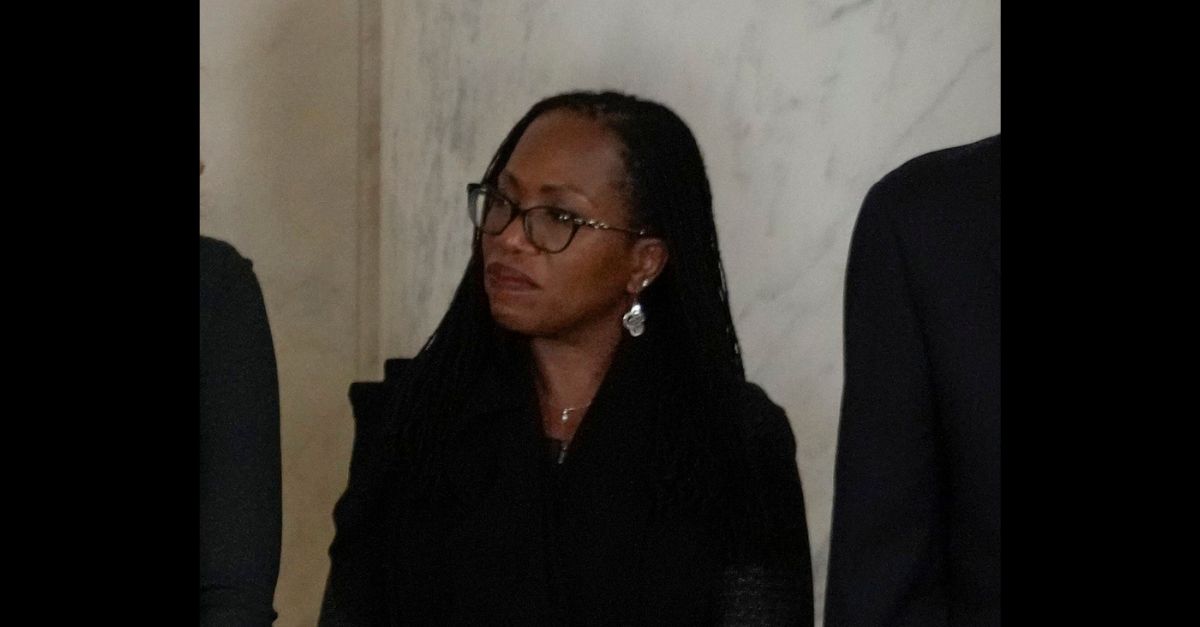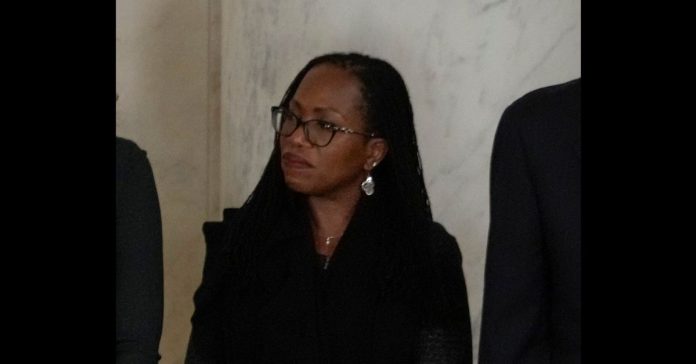
Supreme Court Justice Ketanji Brown Jackson attends a private ceremony for retired Supreme Court Justice Sandra Day O’Connor before public repose in the Great Hall at the Supreme Court in Washington, Monday, Dec. 18, 2023. (AP Photo/Jacquelyn Martin, Pool)
A divided Supreme Court issued an emergency order Monday to allow Idaho to temporarily enforce a blanket ban on transgender health care. The ruling was handed down as part of the Court’s ever-expanding shadow docket, and after multiple concurring and dissenting opinions, only Chief Justice John Roberts was silent as to how he would have voted in the case.
In 2023, Idaho adopted the Vulnerable Child Protection Act, which made it a felony punishable by up to life in prison to provide minors with hormones, puberty blockers, or surgery to affirm a minor’s gender identity. Under the law, which was set to go into effect Jan. 1, those same treatments can still be provided to patients for other purposes.
Two transgender girls receiving estrogen therapy, joined by their parents, sued to challenge the statute. The law was temporarily blocked in its entirety at the district court level. The state asked the U.S. Court of Appeals for the 9th Circuit and then the Supreme Court to narrow that district court ruling such that the law would be enforceable against everyone except the parties to the lawsuit.
Idaho argued that immediate enforcement of the law was necessary for the protection of children who would otherwise be exposed to dangerous medical procedures. The ACLU argued on behalf of the plaintiffs that the justices should keep the law on hold while the underlying fast-tracked appeal as to the law’s constitutionality proceeds.
In a brief order, the justices sided with Idaho and allowed it to enforce the law as to anyone not a party to the current challenge.
Justice Neil Gorsuch penned a 13-page opinion which was joined by fellow conservative justices Samuel Alito and Clarence Thomas in which he proclaimed the decision “a significant step toward addressing the problem” of “universal” injunctions.
Justice Brett Kavanaugh, joined by Justice Amy Coney Barrett, penned a separate concurrence which also focused on the Court’s role in emergency applications over enforcement of new statutes.
Justice Ketanji Brown Jackson penned an eight-page opinion joined by Justice Sonia Sotomayor in which they agreed that the Supreme Court need not “address every high-profile case percolating in lower courts,” and agreed that “few applicants” meet the requirements for emergency relief.
Jackson took issue with her fellow justices’ characterization of the lower court’s ruling in the Idaho case, and said, “even if today’s application actually involved a ‘universal injunction,’ the emergency docket would not be the place to address the open and challenging questions that that issue raises.” Jackson went on to frame her disagreement with the justices’ ruling as an issue of respect for lower court judges.
Two lower court judges who are “no less committed to fulfilling their constitutional duties than we are” found that Idaho’s new law was likely unconstitutional, Jackson reminded her fellow justices. Furthermore, those judges were “much more familiar with the particulars of the case,” and respect for them requires that the case meet “an especially heavy burden” before it would be appropriate for the justices to step in and overrule them.
Jackson underscored the point as she took aim at Gorsuch in a footnote.
“The concurrence seems perplexed by the idea that lower court decisions about interim relief deserve our respect,” Jackson wrote.
She explained that in Gorsuch’s telling, the Court is “either powerless to correct mistakes or hopelessly inconsistent when we do.” Jackson continued, writing that simply saying that a party “bears an especially heavy burden is not to say that burden can never be carried.”
In her dissent, Jackson called the constitutional questions raised by Idaho’s law “significant” in that it raises “new and complex issues.” However, she pointed out, the state did not come to the justices asking for interim relief about an error a lower court may have made about an important merits question.
Rather, Jackson, said, Idaho made a “troubling bid” for emergency relief in which it asked a narrow question about a temporary ruling. Jackson had harsh words for Idaho’s request and her fellow justices’ decision to weigh in on it.
She wrote:
In my view, we should resist being conscripted into service when our involvement amounts to micromanaging the lower courts’ exercise of their discretionary authority in the midst of active litigation. This Court is not compelled to rise and respond every time an applicant rushes to us with an alleged emergency, and it is especially important for us to refrain from doing so in novel, highly charged, and unsettled circumstances. Here, where the State does not even seek relief from the District Court’s determination that the law is likely unconstitutional as to at least some of the individuals it will impact, caution is especially warranted.
Jackson noted that the word “EMERGENCY” appeared in bold capital letters on Idaho’s application, but was “[c]onspicuously minimized” in Gorsuch’s opinion, which treated the matter as “a run-of-the-mill motion for interim relief, just as any court might dispose of such a motion on its regular docket.”
“From the standpoint of an interest in taming our emergency docket, that is folly,” Jackson warned.
Jackson ended her dissent with a statement of “common ground” among the justices: a recognition that the Court’s emergency docket “seems to have become increasingly unworkable.”
Have a tip we should know? [email protected]

